There are millions of books in the world, but the most wonderful of all is the Bible. It is the only book which is read in all nations by scholars, peasants, and little children. It is printed in every language. White people, black people, yellow people, red people, and brown people read this marvellous book. It is the Wonder Book of the whole earth ; the most marvellous collection of printed words in all the world. And it is the Book of Life. We shall read here all the wonderful stories the Bible tells, we shall consider the beautiful life of Jesus ; and when we have finished our stories from the Old and New Testaments, we shall have some little talks together upon serious subjects.
THE STORY OF OUR BIBLE
When you look at inscriptions on monuments and buildings you find that the date is always followed by two capital letters. These letters are either B.C. or A.D. The first of these means the time Before Christ ; the second of these means Anno Domini , the time After Christ.
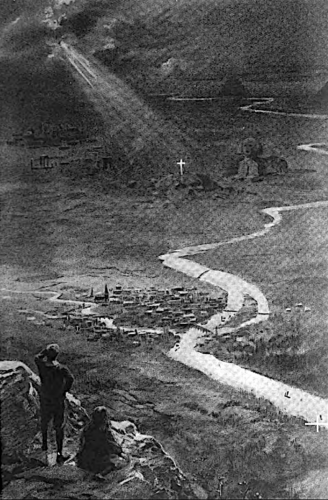
Jesus is the centre of history and time. From the cross men look forward ; from the cross men look backward . Man , you see, has divided time into two great parts , two immense divisions. The first division is the time before Jesus lived among men ; the second division is the time after Jesus appeared on the earth. All over the world time is now divided in this wonderful way.
Now, the Book we are going to read about is divided into two parts, just as time is divided. It has its period called B.C. and its period called A.D. The period called B.C. is known as the Old Testament, and the period called A.D. is known as the New Testament. The word testament used to be called covenant, and this word covenant is really a much better word than testament, because it is truer to the meaning. By the Old Covenant men meant a promise made by God to man before Jesus appeared on the earth ; and by the New Covenant men meant a new promise made by God to man in the life and teaching of Jesus Christ. The New Covenant is really the keeping of the promise made by God to man in the Old Covenant.
Now you see what the Bible is. It is a book about God and man , and the hero of the book is the great central figure in the history of the human race, Jesus Christ. The Old Testament is the history of a certain nation called the Hebrews, or Jews, or Israelites – three names all meaning the same thing . It is their own history written by them- selves. The Jews were chosen by God to teach the other nations about life and the mystery of death.
God promised them that they should be a blessing to all the world. What God promised they wrote down, and kept the writings carefully. They were a wonderful nation , because, although they were guilty of many sins and cruelties , they wor- shipped One God when other nations were praying to heathen gods and bowing down before images made with wood and stone . They were a very poetic and kind-hearted people . They loved to live with their flocks and enjoy the simple blessings of the beautiful earth. They made the home the great thought of their lives. What we call family life, meaning the plea- sures and affections of a happy home, was the chief ideal of this brave people. And what made them so happy and strong was their belief that God was watching over them.
And when they sinned, and sorrow came upon them, and their enemies conquered and ill-treated them , still they said that God would deliver them, because He had promised. So in the midst of their sorrows they began to watch for the coming of some mighty being whom they called Messiah, think- ing that this Son of God would destroy their enemies, give them back their flocks and herds , and set them up as the rulers of the whole earth. All this is written in the Old Testament. They watched and waited for the coming of the Messiah. The promise of the Messiah runs through the Old Testament like a little silver brook winding through a dry country towards the sea. But when the Messiah came they found that He was not a mighty warrior, but a beautiful young peasant, who sat in a weather-beaten ship with simple fishermen, and taught people that to forgive their enemies was better than to fight them . And then the Jews were angry, and refused to believe that He was the Messiah.
The Old Testament, then, shows us these people seeking after the Messiah ; and the New Testament shows us these same people rejecting the Messiah. The whole Bible is , therefore, a Book about the great central Figure of Jesus Christ, who stands in the midst of the world’s ages. In very ancient times men used to write the stories of their fathers on a peculiar paper made from the pith of an Egyptian plant called papyrus. It was on this papyrus that the Jews wrote their history, and the precious writings were very carefully kept as sacred records.
Now, even before Christ came into the world, the Greek people were anxious to learn about the Jews and their clever writing . Men took the history of the Jews told on the papyrus and wrote it down in the language which the Greek people knew. Now, the Greek word for papyrus was Byblus, and this word came to stand for Book ; so that they spoke of the Hebrew writings as Biblia , or the Books. The Latin nation borrowed this word , and our first copies of the Bible were in the Latin language and were called Biblia Sacra, meaning the Holy Books.
At last Englishmen made their own words, and, speaking of all these writings as the Book, and not the Books, called it the Holy Bible. So that Bible means The Book.
You must not think of the Bible as a single book written by one man. It is many books, written at far distant times, by many very different men. These different books have been collected and bound together, because they teach us so clearly about God and man.
To understand the wonderful story of the English Bible we must go back five hundred years and more in the history of our country. In those days the nobles were wicked, and the Church had lost all the beauty of its earliest years. The Pope was living in France, and he filled England with Italian priests, who lived careless lives and made the people pay heavy taxes to the Church in order that it might be a great Power.
But there arose in England at this time one of the greatest men who ever breathed our English air. name was John Wyclif, and he was born in Yorkshire. He was a small, thin, weak-looking man, with a little body, but a great and fervent soul. He was a very famous scholar, and he taught men not to obey the Pope’s com- mands, but to study the Bible for themselves, and obey only Christ Himself.
The poor people re- joiced in John Wyclif, for their only comfort was in religion, and when he sent poor men, dressed in rough serge, through the country lanes, preaching the story of Jesus in plain, homely English, all the peasants and some of the nobles gathered round to listen.
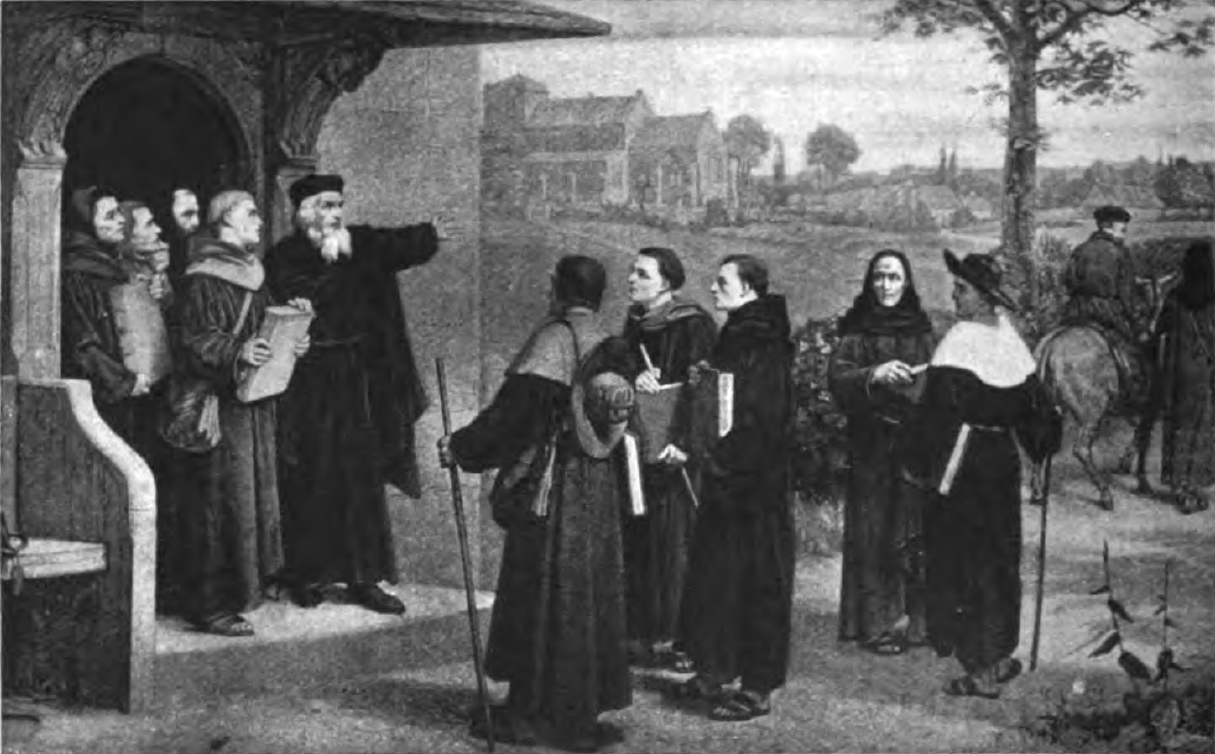
Wyclif was the first man to turn the eyes of the people away from form and ceremony to the beautiful figure of Jesus Christ, the Light of the World. We can never be grateful enough to him for his bravery.
He stood alone against the Pope and the mighty Church of Rome, and when they tried to crush him he made answer : “I believe that in the end the truth will conquer.” He died at Lutterworth, a little village in Leicestershire, and after he was buried the Pope had his bones dug up from the kindly earth, and burned.
About a hundred years after Wyclif’s death there was born in Gloucestershire William Tyndale, who studied the writings of Wyclif, and longed for the day when England should have her own Bible, and be free from Rome and free from Rome’s priests. Once, when he was arguing with a clever doctor of divinity, he suddenly said, “If God spare my life for many years I will see that a boy who drives the plough shall know more of the Bible than the Pope of Rome.”
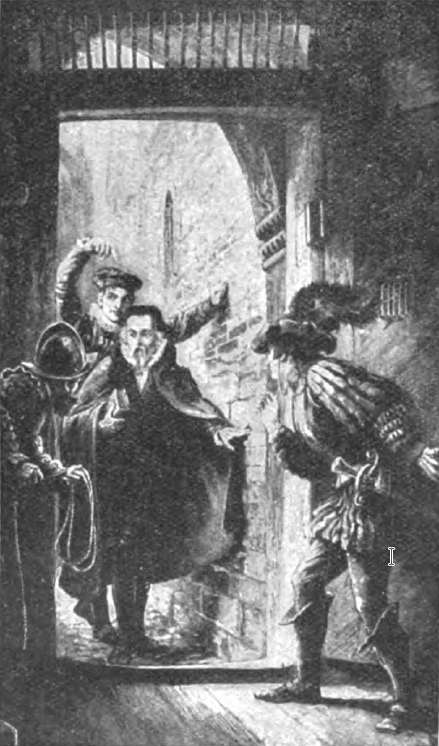
Tyndale got together a company of scholars, went with them very quietly to Hamburg, and there set about translating the Latin Bible into our own English language. They worked early in the morning and late at nights. We are told that in his love for the Bible Tyndale gladly faced “poverty, exile, bitter absence from friends, hunger, and thirst, and cold, great dangers, and other hard arid sharp fightings.” He set up a printing machine.
But Tyndale knew that he was doing a most dangerous work, and that if the Pope could find him, he and his English Bible would be thrown into a fire and burned. So-he had to think how he could get the English Bible secretly into England. At last a great idea came to him of forming a society called the “ Christian Brotherhood.” This society was made up of men who wanted the Bible in English, and who were deter- mined to stand against the antagonism and cruelty of the Roman Pope, even to the death. Many of these brave men had ships, and with their help Tyndale managed to smuggle over his pages. to England. When they reached this country the pages were secretly sent to nobles and merchants belonging to the Christian Brotherhood.
But the nobles were so pleased when they got Tyndale’s writing that they could not keep it secret, and the bishops got to know all about Tyndale and his work.
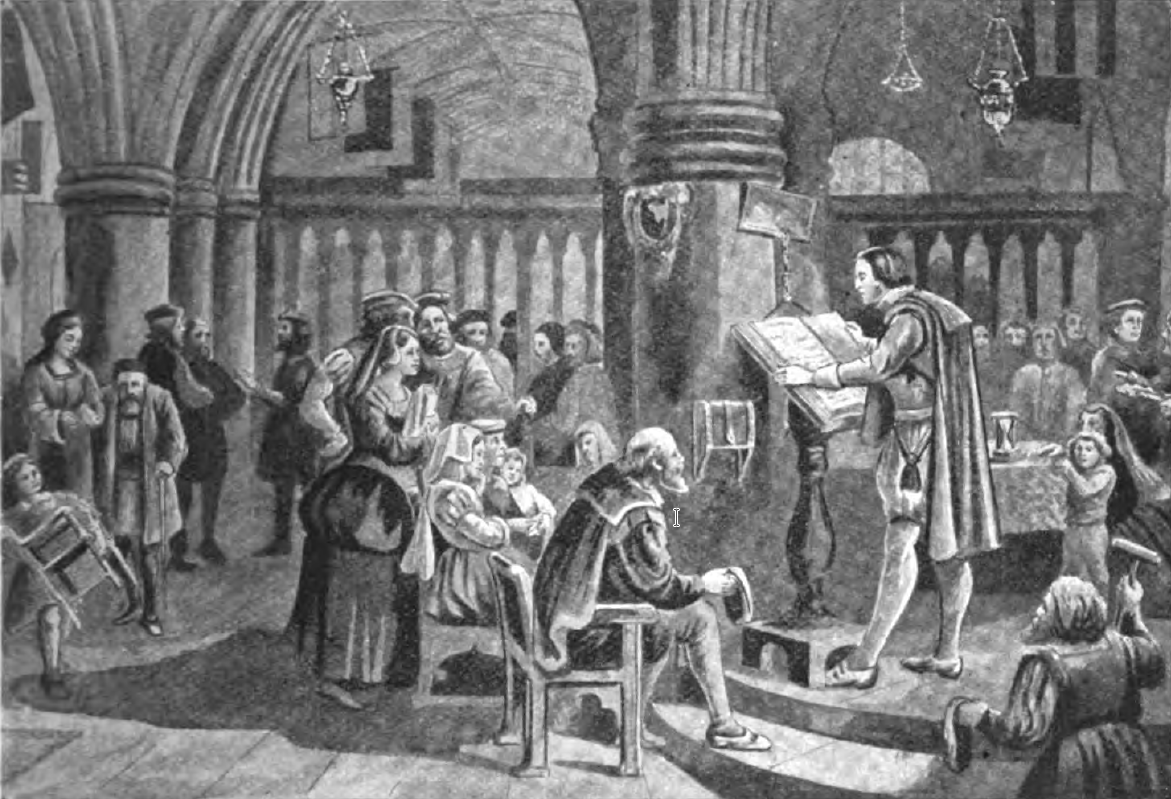
Every effort was made to find the English Bibles, and soon a great fire was lighted in St. Paul’s Churchyard, and a number of the books were burned by the bishops and the priests. The friends of Tyndale were driven out of London, many of them across the sea. Poor, brave, noble Tyndale was now in great danger, because the Pope made up his mind to get him out of the way. Tyndale was driven from town to town, but wherever he went he continued writing the Bible in English. He lived for some time in Antwerp, and then the cunning priests of Rome had him put into a prison near Brussels. Then he was put to death, and his body was burned. But, though they could destroy the body of this great English scholar, the Pope and the priests could not destroy the work he had done. The English people had learned to love their Bible, and they stood together and refused to have anything to do with the Pope and the Church of Rome. The precious English Bibles were carried into the churches, chained with heavy steel so that no one should take them away to the fires, and the people crowded in to hear these sacred words read aloud to them from morning till night.
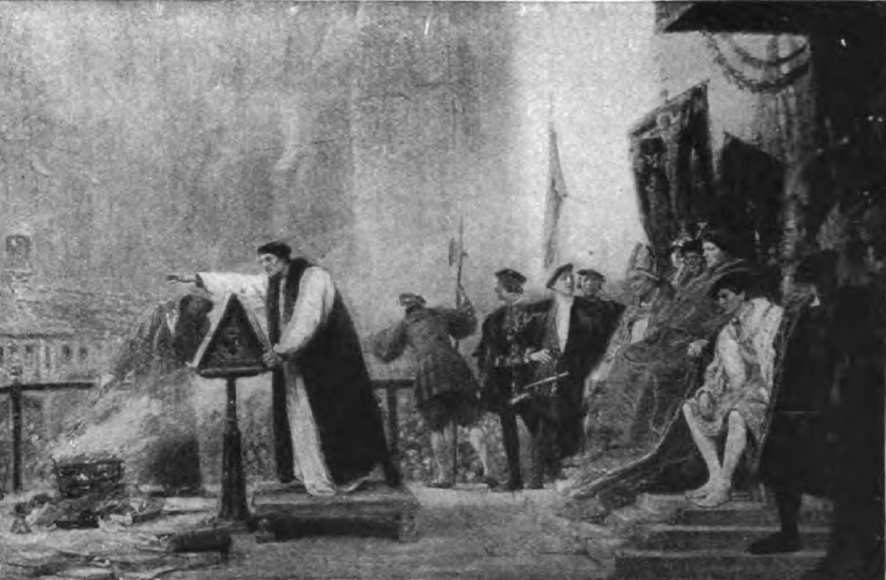
Bibles can now be bought and read everywhere. But think what it must have been for England to hear the Bible for the first time! It was the strangest and most lovely music ever heard on English soil.
The whole country read scarcely any other book, and talked of nothing else but this wonderful new idea of life. They learned that God was the loving Father of the world, that all men are equal before God and members of one great family, and that humility and poverty are better things than pride and wealth! It was like the beginning of a new world.
When Bishop Bonner set up the first six Bibles in St. Paul’s Cathedral, says a writer, crowds of people flocked there to hear them read aloud. “One, John Porter,” a book tells us, “used sometimes to be occupied in that goodly exercise. This Porter was a fresh young man, and of a big stature, and great multitudes would resort thither to hear him, because he could read well.”
When you are taken to St. Paul’s Cathedral try to picture to yourself the crowds of London people round those six great English Bibles chained to the lecterns. Try to picture the fair face of this big young man, John Porter. Try to imagine that you can hear his strong voice rolling down the mighty aisles. And then go back in your memory to the far-off days of brave little John Wyclif, the days of the hunted exile and martyr William Tyndale, writing the first English Bible in Germany, and smuggling over those precious sheets to our island home.
Then you will know how greatly men and women have suffered that you might read in your own tongue the story of Jesus Christ our Lord.
The Bible is the Book of God,
And unto every age it shows
The ancient path that Israel trod,
The grave from whence our Saviour rose.
Two Covenants are found therein,
The Old and New, and both declare
How love alone can conquer sin,
And God alone can answer prayer.
We know not who inscribed each page,
That men have found in every age
But this we know, where’er we look,
The God of comfort in this Book!
- By HAROLD BEGBIE
